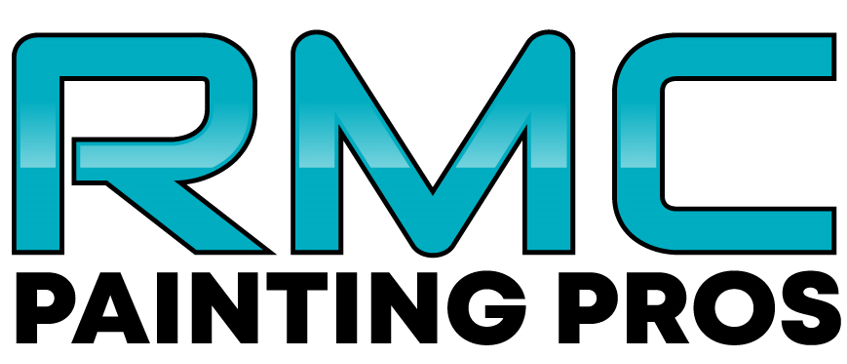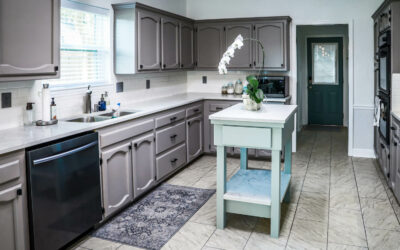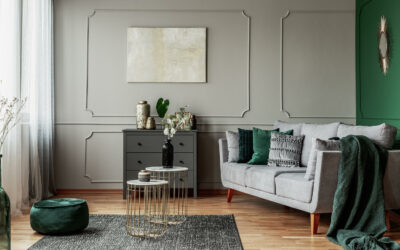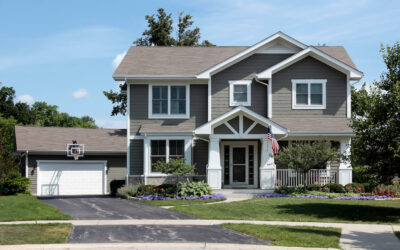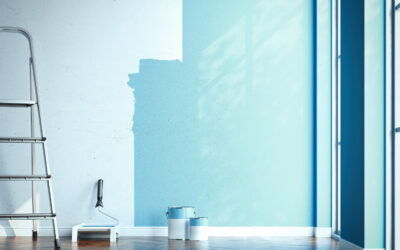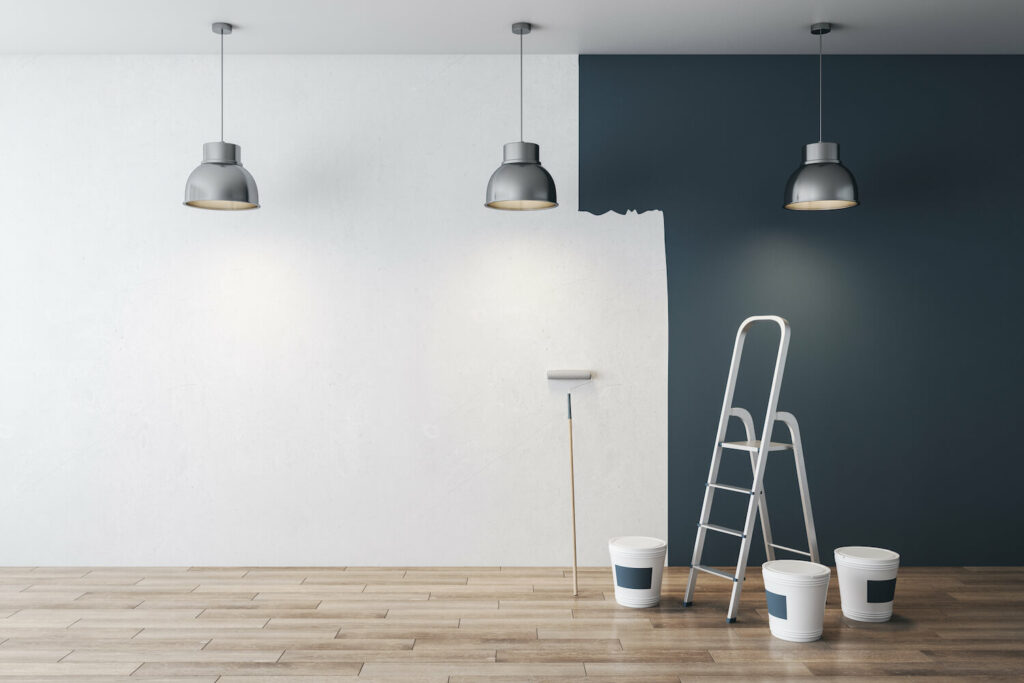
Choosing the right wall treatment for your home is a crucial decision that can significantly impact its overall aesthetic and atmosphere. The two most popular options, interior painting, and wallpaper, each come with their own set of advantages and considerations. In this article, we will delve into the pros and cons of both interior painting and wallpaper to help you make an informed decision based on your preferences, lifestyle, and the unique characteristics of your living space.
Interior Painting
Advantages of Interior Painting
Interior painting remains a classic and versatile choice for homeowners looking to refresh or transform their living spaces. Some of the key advantages of choosing paint for your walls include:
- Endless Color Options: One of the most significant advantages of interior painting is the vast array of color options available. Whether you prefer a neutral palette, bold and vibrant hues, or subtle pastels, paint allows for complete customization to suit your style.
- Ease of Application: Painting is a relatively straightforward process, and many homeowners find it to be a manageable do-it-yourself project. With proper preparation and the right tools, you can achieve professional-looking results without the need for extensive expertise.
- Cost-Effectiveness: In general, painting tends to be more budget-friendly than wallpapering, especially if you choose to tackle the project yourself. The cost of paint and essential supplies is often lower than the combined cost of high-quality wallpaper and professional installation.
Considerations for Interior Painting
While interior painting offers numerous advantages, there are some considerations to keep in mind:
- Maintenance: Painted walls may require more frequent maintenance, especially in high-traffic areas or homes with active children and pets. Touching up paint and dealing with scuff marks can become a regular part of upkeep.
- Limited Texture and Pattern Options: Compared to wallpaper, paint offers limited options for introducing textures and patterns. If you desire a more intricate or textured look, you may need to explore alternative painting techniques or finishes.
- Application Time: While painting is generally a faster process than wallpapering, it still requires time for proper preparation, application, and drying. If you’re looking for a quick transformation, be sure to factor in the necessary time for each coat to dry.
Wallpaper
Advantages of Wallpaper
Wallpaper has experienced a resurgence in popularity in recent years, and for good reason. The advantages of choosing wallpaper for your interior walls include:
- Variety of Patterns and Textures: Wallpaper offers an extensive range of patterns, textures, and designs that can add depth and character to your space. Whether you prefer a subtle texture or a bold, eye-catching pattern, there’s a wallpaper to suit every taste.
- Durability: High-quality wallpaper tends to be more durable than paint, especially in areas prone to wear and tear. Wallpaper can withstand cleaning better than painted surfaces, making it a practical choice for busy households.
- Concealing Imperfections: Wallpaper can hide imperfections in the walls, such as small cracks or uneven surfaces. This makes it an excellent choice for older homes or rooms with less-than-perfect walls.
Considerations for Wallpaper
Despite its advantages, wallpaper also comes with certain considerations that may influence your decision:
- Professional Installation: While some homeowners may choose to install wallpaper themselves, achieving a flawless result often requires professional expertise. The cost of hiring a professional installer should be factored into the overall budget for a wallpaper project.
- Limited Color Choices: While wallpaper offers a wide range of patterns and textures, the color choices within each design may be more limited than the endless spectrum of paint colors. If you have a specific color scheme in mind, finding the perfect wallpaper may require additional effort.
- Removability: While modern wallpapers are designed to be removable, the process can be more time-consuming and labor-intensive than repainting. If you enjoy frequently updating your home’s aesthetic, the commitment to wallpaper may be a drawback.
Making the Decision
When deciding between interior painting and wallpaper, consider the following factors:
Style and Aesthetic Preferences
Your style and the overall aesthetic you want to achieve in your home play a significant role in the decision-making process. If you prefer a classic, timeless look with a wide range of color options, paint might be the better choice. On the other hand, if you’re drawn to patterns, textures, and a more eclectic or luxurious ambiance, wallpaper could be the ideal solution.
Maintenance and Longevity
Evaluate the level of maintenance you are willing to commit to and the longevity you expect from your wall treatment. If you have a busy household with children and pets, the durability of the wallpaper may be appealing. However, if you prioritize low maintenance and easy touch-ups, paint may be the more practical option.
Budget
Consider your budget for both materials and installation. While paint is generally more budget-friendly, high-quality wallpaper and professional installation can be a significant investment. Determine your priorities and allocate your budget accordingly, keeping in mind any long-term savings in maintenance costs.
Time and Effort
Assess the amount of time and effort you are willing to dedicate to the project. Painting is often a quicker process, especially for those with some DIY skills. Wallpapering, on the other hand, may require more time, particularly if you choose intricate patterns or textures.
The Allure of Interior Painting
While both interior painting and wallpaper have their merits, let’s explore the unique charm of interior painting and why it may be the ideal choice for your home.
Timeless Elegance and Versatility
Interior painting has a timeless elegance that can effortlessly adapt to evolving design trends. The ability to choose from an extensive palette of colors allows you to create a personalized and enduring aesthetic. Whether you prefer the tranquility of soft neutrals, the vibrancy of bold hues, or the sophistication of muted tones, paint provides a versatile canvas for your creative vision.
The simplicity of a freshly painted wall can serve as a backdrop for various styles of décor, offering the flexibility to change furnishings and accessories without clashing with intricate patterns. This adaptability ensures that your home remains a reflection of your evolving tastes and preferences over time.
DIY Potential and Cost-Efficiency
One of the undeniable advantages of interior painting is the accessibility of the do-it-yourself approach. With the right tools, a bit of guidance, and a willingness to invest your time, painting can be a rewarding and cost-effective project. Many homeowners find joy in the hands-on experience of transforming their living spaces with a fresh coat of paint, adding a personal touch to every brushstroke.
The cost-effectiveness of paint is particularly appealing, especially for those working within a budget. With a reasonable investment in quality paint and essential supplies, you can achieve a high-impact transformation without breaking the bank.
Low Maintenance Appeal
For those who prefer a low-maintenance approach to home care, interior painting offers a distinct advantage. Touch-ups and maintenance are generally more straightforward with paint, making it an ideal choice for busy households or individuals with limited time for extensive upkeep.
The ease of addressing scuff marks, stains, or minor imperfections ensures that your walls maintain their pristine appearance with minimal effort. This convenience is a practical consideration for those who value a polished and well-maintained home without the need for frequent interventions.
Creating Ambiance with Finishes
Beyond the vast color options, interior painting allows you to explore various finishes that can contribute to the overall ambiance of your space. Matte finishes exude a subtle and sophisticated charm, while glossy finishes can introduce a touch of glamour. Satin and eggshell finishes strike a balance, offering durability with a gentle sheen.
These finishes not only add depth and character to your walls but also play a crucial role in shaping the mood of each room. The ability to customize not just the color but also the texture and sheen of your walls provides an unparalleled level of control over the atmosphere you wish to create.
Conclusion
In the timeless debate between interior painting and wallpaper, the allure of painting lies in its timeless elegance, versatility, and accessibility. The ability to create a personalized aesthetic, coupled with the potential for a rewarding do-it-yourself experience, positions interior painting as a compelling choice for homeowners.
With the myriad of color options, low-maintenance appeal, and the opportunity to play with various finishes, interior painting offers a canvas for self-expression that evolves with your tastes and lifestyle. As you embark on the journey of transforming your living space, consider the enduring charm of a freshly painted wall—a canvas waiting for your unique vision to unfold.
Read Other Blog Posts
Paint Your Way to a Stunning Kitchen: The Magic of Cabinet Painting
Transform Your Kitchen with...
The Expert’s Palette: Insider Pro Tips from an Interior Painting Contractor
When it comes to transforming...
The Role of Exterior Paint in Curb Appeal: How to Choose the Right Color
When it comes to creating a...
How Summer Weather Could Affect Your Exterior Painting Project Job
Summer is a popular time for...
How to Choose the Right Exterior Painting Contractor for Your Home
Selecting the right exterior...
10 Reasons Why You Should Hire an Expert Interior Painter Instead of DIY Project
Painting the interior of your...
